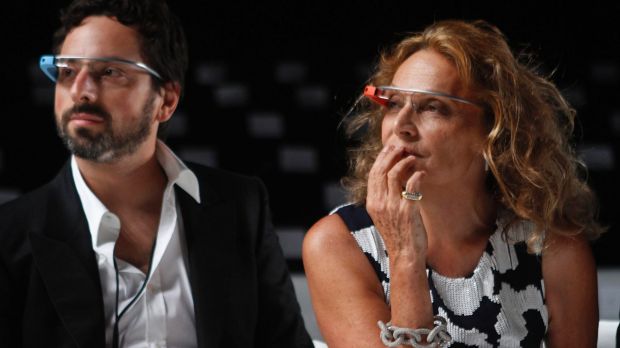
Google co-founder Sergey Brin sporting Google Glass at during New York Fashion Week in 2013. Photo: Reuters
Google says it will halt sales of its Glass eyewear, a move that could frustrate fans who bought the quirky head-mounted computer but which the company pitched as a “graduation” of the technology from a research experiment to a product that could be used in factories, hospitals and other workplace environments.
Monday will be the last day anyone can buy the $US1500 ($A1823) gadgets, which arrived on the consumer market less than a year ago but seemed to appeal to a very small demographic of early adopters.
Google Glass will continued to be led by Ivy Ross, a former jewelry designer, but the operation will move out of the secretive Google X research lab where it was developed and fall under the direction of Tony Fadell, co-founder and chief executive officer of the home automation company, Nest Labs, which Google acquired a year ago for $US3.2 billion.

Tony Fadell will now lead up development of Glass.
That signaled to some Google’s direction towards refining the use of Glass as a product that firms can adapt to specific uses in their workplaces.
“I think the move today reflects its maturity, moving Glass out of skunkworks into product development,” said Jon Fisher of CrowdOptic, one of five certified developers that have worked with Glass.
But BBC technology correspondent Rory Cellan-Jones said that although Google was trying to paint Thursday’s announcement as good news, it wasn’t necessarily the case.
“Make no mistake – Google Glass is dead, at least in its present form,” Cellan-Jones said.
Others said it was too early yet to mourn its passing.
The one thing we can say with confidence at this point is that Google Glass is either dead or not dead. — Will Oremus (@WillOremus) January 15, 2015
The wearable device championed by Google co-founder Sergey Brin struggled to gain traction as a consumer item last year and was frequently lampooned for its social awkwardness.
Several key Google employees instrumental to developing Glass also left the company in the last 12 months, including lead developer Babak Parviz, electrical engineering chief Adrian Wong, and Ossama Alami, director of developer relations.
And a Glass funding consortium created by Google Ventures and two of Silicon Valley’s biggest venture capitalists, Kleiner Perkins Caufield & Byers and Andreessen Horowitz, quietly deleted its website, routing users to the main Glass site.
A recent survey of 16 Glass app makers also found nine had stopped work on their projects or abandoned them, mostly because of the lack of customers or limitations of the device. Three more switched to developing for business, leaving behind consumer projects.
Even Facebook chief executive officer Mark Zuckerberg seemed to pan the devices this week during a visit to South America.
“I think it’s pretty easy to imagine that in the future we will have something that we can wear,” Zuckerberg said during a question-and-answer session he held in Colombia. “It will look just like normal glasses – it won’t look weird like some of the stuff that exists today.”
San Jose Mercury News, Reuters and Fairfax Media
